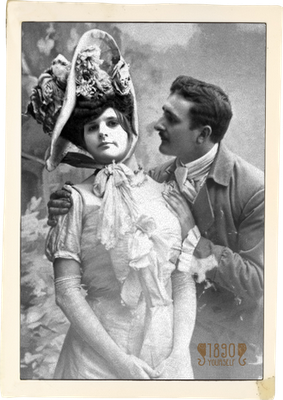Faye L. Booth's Blog, page 3
February 15, 2011
Transatlantic twins
I've just seen the cover for the US edition of Trades of the Flesh, and as you can see, it's very similar to its British predecessor!
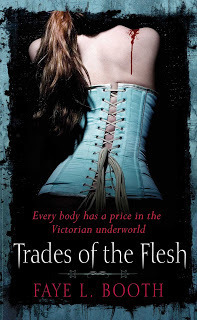
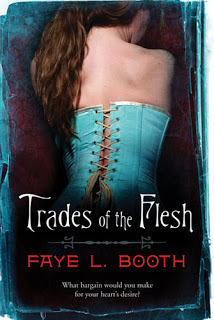
Above: the UK paperback from Macmillan New Writing. Below: the US edition from Tor Forge.
This is the first time I've seen the cover for a foreign edition of one of my books - exciting stuff.


Above: the UK paperback from Macmillan New Writing. Below: the US edition from Tor Forge.
This is the first time I've seen the cover for a foreign edition of one of my books - exciting stuff.
Published on February 15, 2011 11:56
Twitter competition
Twitter users - Cassie, my publicist at Tor, is holding a competition to win an ARC of the US edition of Trades. Click the pic to go to the relevant tweet:
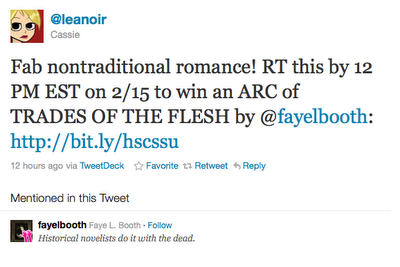
If desired, I'll add something extra to the prize - a signed bookplate. If you win, tell Cassie to pass on your address and I'll send one separately.

If desired, I'll add something extra to the prize - a signed bookplate. If you win, tell Cassie to pass on your address and I'll send one separately.
Published on February 15, 2011 10:08
February 14, 2011
Obligatory Valentine post
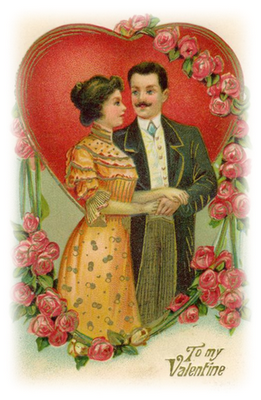
Alchemy
Because of the light of the moon,
Silver is found on the moor;
And because of the light of the sun,
There is gold on the walls of the poor.
Because of the light of the stars,
Planets are found in the stream;
And because of the light of your eyes
There is love in the depths of my dream.
(Francis Carlin)
No, this isn't addressed to anyone - it just seemed like a good opportunity to post a small example of the wealth of romantic Victoriana out there.
Published on February 14, 2011 10:39
January 28, 2011
1890 Yourself
Published on January 28, 2011 14:34
January 4, 2011
My thoughts on my new Kindle.
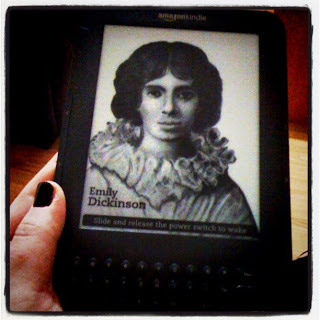 This is Stanton. I got him for Xmas; and yes, he is a he and yes, I did name him. Ask Quincey the laptop and Cornelius the phone if you don't believe me. Having had a few days to play with him (OK, I admit that sounded a bit iffy), I've composed a few thoughts on the pros and cons of e-readers (or rather, this particular model of e-reader - the Amazon Kindle 3 Wi-Fi - as I haven't had experience with any others) as I see them.
This is Stanton. I got him for Xmas; and yes, he is a he and yes, I did name him. Ask Quincey the laptop and Cornelius the phone if you don't believe me. Having had a few days to play with him (OK, I admit that sounded a bit iffy), I've composed a few thoughts on the pros and cons of e-readers (or rather, this particular model of e-reader - the Amazon Kindle 3 Wi-Fi - as I haven't had experience with any others) as I see them.Like many writer/bibliophiles I've observed, I resisted the idea for quite some time, although I couldn't have given you any definite reasons why. Something about them just made me feel uneasy, although then again, that's pretty much par for the course with me as far as new technology's concerned. I used audio cassettes for quite some time after the CD era commenced, and I was convinced DVDs would never catch on. There were, of course, some misgivings I could have named - primarily aesthetic ones - and I was wary about allowing a pastime such as reading to become battery-dependent. Still, I couldn't help but notice, as an increasing number of my friends gave in and got themselves Kindleified, that they all seemed to love them; and even my fellow writers and/or bibliophiles admitted that they liked them more than they'd expected to. My curiosity piqued, I decided I wanted one, and got it for Xmas. Sure enough, I've become one of those liked-it-more-than-I-thought-I-would people.
So, what are my thoughts?
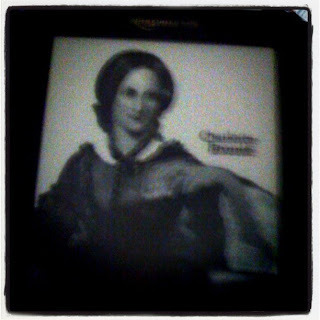
Pros
A huge amount of reading matter can be kept in a ridiculously small, light and slender device. I don't know about you, but I'm one of those people who has to have a book with me at all times, and I doubt the relevant medical authorities would approve if I attempted to carry the OED; Roget's Thesaurus; Writers' Market; Mrs Beeton's Book of Household Management and the complete works of Wilde, Poe and the Brontes all at the same time, but I can do that on the Kindle and take up no more space than I would with a single slim paperback. The closest comparison I can find on my bookshelf, size-wise, is a paperback copy of The Crucible: the naked Kindle is more or less the same size, although I do use a case now - more on that in a second. And of course, even if you're reading a lengthy book, you don't have to hold anything heavy while doing so.
If you've never seen a screen display with electronic ink, you can't appreciate how uncanny it is. Quite apart from the optical and ergonomic benefits to reading on the Kindle's screen as opposed to, say, a smartphone or tablet (and those benefits are considerable - look 'em up), after actually seeing a book's pages on a Kindle, my conviction that e-readers are aesthetically much worse has taken a beating, at least as far as the inside of a book is concerned. I don't at this point have any illustrated books on there, but the Kindle displays a range of black-and-white screensavers when it's at rest, and once again it captures them beautifully. Some of them are gorgeous, too - you can see the portraits of Emily Dickinson, Charlotte Bronte and Virginia Woolf in this post (I know the photo of the Bronte one's terrible, but trust me - the screensaver's lovely); and there's one with birds and one that looks like a page from an illuminated manuscript. That goes at least some way towards redressing some of the aesthetic concerns.
You can add and remove bookmarks (although a book will always default to the last page you read upon reopening even if you forgot to bookmark it), search within the book (obviously invaluable for dictionaries and thesauruses, and comes in handy in other non-fiction and indeed fiction, too), and add removable highlights and annotations, which are particularly good if, like me, you're wary of marking paper books. As well as being saved in the book itself, your bookmarks, highlights and annotations from all your books are saved together in a folder on the Kindle's home screen (My Clippings) if you want to access them quickly.
The Kindle comes with two Oxford Dictionaries already loaded onto it - a British one and an American one. As well as being useful in themselves, if you're reading and come across a word you want defined, you can click to it and the default dictionary will give you a little banner with the word's definition without leaving the book. Be warned, though, Brits: for some reason the default dictionary is pre-set as the American one even in Kindles sold in the UK, with UK plugs for the power adapter and everything, so you have to change it if you want it to default to the British one (from the home screen, Menu-Settings-Menu-Change Primary Dictionary).
You can create 'collections' - essentially, folders into which you can sort all your books so you don't have a socking great list on your home screen. Mine are pretty self-explanatory - Fiction, Non-Fiction, Classics, Research; that type of thing - but you can get as intricate and obscure as you like.
It's easier to read one-handed (like if you're eating, you grubby-minded buggers), as you don't have to hold it open or fumble with pages (there are buttons on the sides for paging back and forward).
The third generation Kindle is, in my humble opinion, much better-looking than its predecessors. I mean, I never really find gadgets attractive per se, but gadgets that are white (as the Kindles were in previous generations) just look cheap and plasticky to me (I think it comes from being old enough to remember those big-and-ugly early laptops, which were so often white); and of course white gets grubby sooner. The new charcoal colour is so much nicer. The aim when designing the Kindle 3 was apparently to make it 'disappear in your hands', the way a book does (you become lost in what you're reading and don't consciously 'see' the paper etc), and I find the K3 does do that. And if you want it to look more like a book, there are cases that can achieve that (while protecting the device).
Battery life and charging speed are both great. Full charge is achieved quite quickly, and you don't have to recharge for a while (indeed, you're advised not to top up the battery daily if you want to get the best out of said battery).
Less paper is required for an e-book (or rather, no paper), and e-books don't have to be transported in lorries or stored in warehouses, so that improves their green rating.
You can download sample chapters if you want to preview a book, which has two handy functions: first, the obvious (you can get an idea of whether you want to buy it); but I also use sample chapters as a shopping list; visual reminders of books I plan to buy in the future.
Near-instant delivery of books (under a minute from clicking the 'buy' button, even for huge lummoxes of books!); and the prices of most of them are brilliant. A load of out-of-copyright stuff (quick reminder: to work out whether a book is in copyright or not, go from the end of the calendar year in which the author snuffed it and add 70 years) is completely free (or stupidly cheap: my complete works of Wilde, Poe and the Brontes were 75p, 69p and £1.28 respectively, and you can download individual works by these authors for nowt). For those authors who are still alive, prices are usually still very competitive: to state a well-known example, We Need To Talk About Kevin by Lionel Shriver (lovelovelove that book) is £3.20. You do still find the odd e-book that doesn't seem to be much cheaper than a paper book, or occasionally one that's outright expensive, but on the whole Kindle books are cheaper.
Customer services, should you need to contact them, are friendly and helpful. You can either email them through the Amazon website, phone them, or get them to phone you - and when they offer you the opportunity to have them phone you now, they do mean now, not when they get around to it. Chances are, though, the Kindle support section on Amazon will answer your question without you having to contact anyone directly.
It doesn't go into landscape mode automatically when you tilt the device. This is something that really bugs me with my phone, and I imagine it would be even worse in an e-reader, especially if reading in bed. You have to enable landscape reading deliberately, although I haven't needed to.
The wireless internet connection works quickly and efficiently; it clicks on and off. (Best keep it off when not downloading content or browsing the e-book store, though - it'll prolong battery life even further.)
If you want to read PDFs or word processor docs on your Kindle, you can: you get a dedicated email address to which you email anything like that. When you next wake your Kindle and switch on wireless, anything emailed to your Kindle email address will appear on your home screen.
The packaging is all cardboard - no plastic or polystyrene! I'm a hippie, these things matter to me.
ConsThe name! I really hate the name; in fact, I try to avoid calling Stanton a Kindle whenever I can - obviously, in a blog post dedicated to discussing Kindles as a species that would be a bit daft, but generally speaking I don't like using that word to describe an e-reader. Why? Well, apart from finding the connection implied by one of the K3's screensavers (featuring waffle about sparking - or 'kindling' - inspiration and imagination etc) tenuous at best; I think the most obvious association between books and the word kindle is one of book-burning. Don't like the name at all.
Despite being (I repeat, in my view) the best-looking Kindle model thus far, let's face it - no gadget is as attractive as most books. There isn't the same texture (a satiny paperback cover, the grain or weave of a hardback, the weight of paper); or that vaguely vanilla-esque 'new book' smell (and apparently I'm not the only one who feels that way!). And I can't see the same appeal in a room whose walls are lined with shelves thick with e-readers, somehow...
Ultimately, the Kindle is battery-dependent, which of course has its own limitations. As I've said, the battery life is excellent, so with half-competent management of your charging and use schedule it shouldn't pose too much of a problem, but still - paper books don't need batteries, do they? Gadgets seem more vulnerable, too (paper books can't have software failures, either; and although it wouldn't be desirable to drop either a book or a Kindle in the bath, I'm guessing the Kindle would come off worse).
Almost too slender! It's just such a dainty little thing, it felt so slight and vulnerable in my hands before my case arrived. Cases do remedy this, though, as well as protecting it and - in some cases - making it look more book-like. My case is a book-style affair in purple faux leather, and Stanton now feels less precarious in my hands. If the Kindle itself were thicker, then it would be even thicker once a case had been added, so on balance I think it's better as it is, but if you do feel more comfortable holding it in a case, you're not alone.
You can't read in poor light any more than you can with a paper book - although it does make it better for you (see the point about e-ink).
Some of the screensavers are ugly (or rather, they feature pictures of some rather unfortunate-looking authors; and I'm not too struck on the one with the Kindle logo either). You can't opt to use a completely custom screensaver image (well, it is doable, but it involves using a hack that may void your warranty), but I don't think that would even be necessary for most people if you could choose to use one (or a few) of the existing ones, so only the ones you like appear. Yes, that's a fiddly little request, but this is the sort of thing that leads to devices and software being improved.
Not everything is available in Kindle format (yet; although Amazon say this is their eventual aim). I'm gagging to add Slammerkin by Emma Donoghue (one of my favourite historical novels) to my Kindle library, and although two of my favourite books on writing are available for the Kindle, Bullies, Bastards & Bitches isn't yet, which is annoying. And the Historical Thesaurus of the OED would be lovely, too. (She said hopefully...) You can, however, request a Kindle format of a book by visiting the book's page on Amazon and clicking the relevant link under the cover art pic on the top left. The requests are passed on to the publisher - you just have to hope they're feeling obliging!
Not everything would suit the Kindle format, for that matter. The electronic ink display is black and white, and therefore anything that relies on colour (books of artwork or photography spring to mind) would be compromised. But such books are a minority, after all.
Despite having two dictionaries pre-loaded onto it, the Kindle doesn't come with an inbuilt thesaurus. You can pick up Roget's from 74p, so it's not an insurmountable or expensive problem, but still, I'm surprised Amazon didn't think of it.
Despite being able to add Kindle books to your Amazon wishlist, you can't actually receive them as gifts from anyone (bluh?). They could give you Amazon vouchers to spend on what you want, though, and the wishlist could form a shopping list, I suppose; albeit a shopping list everyone with access to your wishlist can see, if such things concern you.
Be careful not to buy books by mistake! The buying system on the Kindle store is one-click, and the cursor on a newly-loaded book page in the store is automatically hovering over the 'buy' button: hit return or the centre of the five-way buttons by mistake and you've bought the book! The next page that loads will include a link to cancel such purchases, but hit the thing bloody sharpish - as I said, the delivery time is lightning-fast.
If you like it, you may feel like a bit of a traitor.
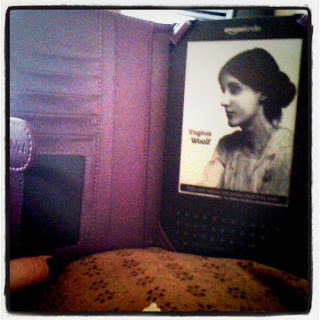 So, my conclusions? As a whole, I've been surprised by how much I've loved it, and I'm definitely not regretting my decision. It isn't perfect - but what is? - and it will never completely replace paper books for me, but I can see it playing a much larger part in my reading life than I ever did before. E-books look set to become a key development in the future of publishing, which in itself needn't be a big problem for authors - musicians are doing fine AiT (Anno iTunes), after all.
So, my conclusions? As a whole, I've been surprised by how much I've loved it, and I'm definitely not regretting my decision. It isn't perfect - but what is? - and it will never completely replace paper books for me, but I can see it playing a much larger part in my reading life than I ever did before. E-books look set to become a key development in the future of publishing, which in itself needn't be a big problem for authors - musicians are doing fine AiT (Anno iTunes), after all. In summary - thumbs up!
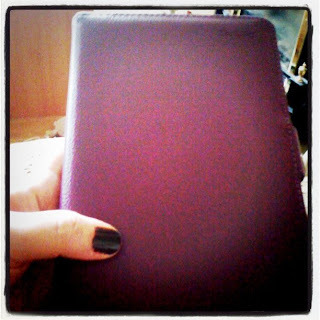
Published on January 04, 2011 19:57
December 1, 2010
Stick it in your orifice of choice in a suitably tasteless manner.
This is an excellent rebuttal of the the censorship-and-stifling-of-creativity-dressed-up-as-humorous-literary-concern that is the Bad Sex Awards. I've been very uncomfortable with the concept of the BSA for a long time, as you probably know if you follow me on Twitter and/or Tumblr. The Bad Sex Awards appear to take little account of the context of a 'bad' sex scene (if the sex being described seems less than stellar, or the character doing the describing does so in an off-putting manner, might that not tell us something about the character/s and/or what's happening to them, rather than automatically being grounds to point and sneer at the author?); and it raises all the usual points about the sort of people who spend their lives knocking down others' efforts instead of actually doing something worthwhile themselves:
Particularly worryingly, suggestions have begun to surface that it might be better to tone down or omit your sex scenes in order to avoid attention from the likes of the BSA committee - and that's what I meant by censorship and stifling. I think that's tragic - makes me want to play Prince Charming at top volume:
"Ridicule is nothing to be scared of..."
My other concerns with the Bad Sex Awards are summed up beautifully in these extracts from the article I linked at the top of this post (which is definitely worth reading in detail):
In the words of its founder, Auberon Waugh, the "prize" is for "redundant passages of sexual description in the modern novel" – a perfectly reasonable notion in itself but one that seems to have become confused. What exactly is "redundant"? It seems to me that anything that grapples head on with the sexual act can be considered so.
And this leads to a wider concern of mine: prudishness. There is something peculiarly and pitiably British about tittering along in the audience at the Bad Sex awards as hammed up actors make a mockery of earnest authors' attempts to render the mystique of the sexual experience. Certainly, it's a laugh. And granted, bad sex in fiction lends itself to parody and hilarity more than the depiction of most other parts of life. But I think this says as much about readers as it does about writers. After all, shouldn't sex be a part of fiction just as much as it is a part of life?
In a sense, my question is: what is good sex in fiction as opposed to mere pornography? (Which also leads me to ask: does good fiction suddenly stop becoming good if it's arousing?)
I've said it before and I'll say it again - ALL fiction is gratuitous, so why clutch our pearls over one element of it in particular? Sheer bloody prudishness. I suggest that any future winners of the BSA should publicly rejoice, because their winning proves that they were not cowed into giving their work a Puritan makeover; nor intimidated by those who style themselves as authorities on what constitutes 'good' art. One thing you do need for good sex (metaphorically and in some cases literally) is balls.
Particularly worryingly, suggestions have begun to surface that it might be better to tone down or omit your sex scenes in order to avoid attention from the likes of the BSA committee - and that's what I meant by censorship and stifling. I think that's tragic - makes me want to play Prince Charming at top volume:
"Ridicule is nothing to be scared of..."
My other concerns with the Bad Sex Awards are summed up beautifully in these extracts from the article I linked at the top of this post (which is definitely worth reading in detail):
In the words of its founder, Auberon Waugh, the "prize" is for "redundant passages of sexual description in the modern novel" – a perfectly reasonable notion in itself but one that seems to have become confused. What exactly is "redundant"? It seems to me that anything that grapples head on with the sexual act can be considered so.
And this leads to a wider concern of mine: prudishness. There is something peculiarly and pitiably British about tittering along in the audience at the Bad Sex awards as hammed up actors make a mockery of earnest authors' attempts to render the mystique of the sexual experience. Certainly, it's a laugh. And granted, bad sex in fiction lends itself to parody and hilarity more than the depiction of most other parts of life. But I think this says as much about readers as it does about writers. After all, shouldn't sex be a part of fiction just as much as it is a part of life?
In a sense, my question is: what is good sex in fiction as opposed to mere pornography? (Which also leads me to ask: does good fiction suddenly stop becoming good if it's arousing?)
I've said it before and I'll say it again - ALL fiction is gratuitous, so why clutch our pearls over one element of it in particular? Sheer bloody prudishness. I suggest that any future winners of the BSA should publicly rejoice, because their winning proves that they were not cowed into giving their work a Puritan makeover; nor intimidated by those who style themselves as authorities on what constitutes 'good' art. One thing you do need for good sex (metaphorically and in some cases literally) is balls.
Published on December 01, 2010 12:24
November 18, 2010
The shape of things to come...
The thing about me is that you can usually get a good idea of what I've been up to from the markings on my flesh.
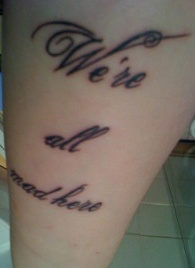
`But I don't want to go among mad people,' Alice remarked.
`Oh, you can't help that,' said the Cat: `we're all mad here. I'm mad. You're mad.'
`How do you know I'm mad?' said Alice.
`You must be,' said the Cat, `or you wouldn't have come here.'
Alice didn't think that proved it at all; however, she went on. `And how do you know that you're mad?'
`To begin with,' said the Cat, `a dog's not mad. You grant that?'
`I suppose so,' said Alice.
`Well, then,' the Cat went on, `you see, a dog growls when it's angry, and wags its tail when it's pleased. Now I growl when I'm pleased, and wag my tail when I'm angry. Therefore I'm mad.'
(Alice's Adventures in Wonderland by Lewis Carroll, 1865)
As was the case with the Lady of Shalott tattoo on my right arm, this was beautifully done by Iain Clark at Aurora Tattoo in Lancaster, and photographed quite appallingly by me (it isn't easy to take a picture of your own arm with a mobile phone, so I had to take one upside-down and rotate it). It's still pink and puffy, but you get the idea. I feel a bit less lopsided now!

`But I don't want to go among mad people,' Alice remarked.
`Oh, you can't help that,' said the Cat: `we're all mad here. I'm mad. You're mad.'
`How do you know I'm mad?' said Alice.
`You must be,' said the Cat, `or you wouldn't have come here.'
Alice didn't think that proved it at all; however, she went on. `And how do you know that you're mad?'
`To begin with,' said the Cat, `a dog's not mad. You grant that?'
`I suppose so,' said Alice.
`Well, then,' the Cat went on, `you see, a dog growls when it's angry, and wags its tail when it's pleased. Now I growl when I'm pleased, and wag my tail when I'm angry. Therefore I'm mad.'
(Alice's Adventures in Wonderland by Lewis Carroll, 1865)
As was the case with the Lady of Shalott tattoo on my right arm, this was beautifully done by Iain Clark at Aurora Tattoo in Lancaster, and photographed quite appallingly by me (it isn't easy to take a picture of your own arm with a mobile phone, so I had to take one upside-down and rotate it). It's still pink and puffy, but you get the idea. I feel a bit less lopsided now!
Published on November 18, 2010 12:07
November 8, 2010
Round robin: why I gravitated towards the Victorian era.
There's a round robin happening on the MNW blog at the moment in which we're asking each other questions, and I just posted my answers to Tim Stretton's questions, and posed my own questions for Alis Hawkins. Tim asked me why I chose to write about the Victorians and whether I can see myself writing about any other time periods, so do pop along and check that out.
Published on November 08, 2010 14:22
October 29, 2010
Influential writers part one.
There's a meme going round on Facebook at the moment asking people to list fifteen writers that influenced them in fifteen minutes, and it got me thinking so I decided to make a similar post here. This will take me longer than fifteen minutes to write as I want to go into a bit more detail and include quotes, and I'm only doing ten writers instead of fifteen; partly so I can go into more detail, but also to avoid repetition of similar reasons for their influence on me, so while this won't be an exhaustive list of my influences, I hope it gets under the bonnet of them a bit more. I'm including writers of plays, comedy and scripts, too - I tend to find that people expect a novelist's influences to consist solely of other novelists, which most certainly isn't true in my case. I count influences in all the arts, and a few scientific ones too, and I most certainly wouldn't be the writer I am without them. So, in no order, here are five writers who have influenced me (the other five will follow in a separate entry so I can post this before it becomes totally stale)...
1) Oscar Wilde. Of course, I wouldn't dare compare my writing to dear Oscar's, but we're talking influences here, and the first time I sat down and really read a piece of his (De Profundis), I was blown away by it. I think it's easy for people, regardless of the time they live in, to stereotype our ancestors and see them not so much as people but as nondescripts in funny clothes; like background figures in a painting or a period drama, who weren't so much individuals as carbon copies of our mental image of the zeitgeist at the time they lives (ALL Victorians were sex-hating prudes, don't you know!), and I defy anyone to continue to hold such a view after reading that essay. The humanity and modernity of Wilde's voice is achingly evident, and the way in which he writes about the torments he suffered following his conviction and imprisonment grabs you by the collar and forces you to see Wilde the human being, rather than just Wilde the legendary, impeccably-attired wit. It's something that stayed with me, and something I try to capture in my own work: the fact that the Victorians were as individual as you or I, and that they had feelings too. That sounds so obvious when worded that bluntly, but I really do think that plenty of people don't really see that, on a deep, subconscious level.
On November 13th, 1895, I was brought down here from London. From two o'clock till half-past two on that day I had to stand on the centre platform of Clapham Junction in convict dress, and handcuffed, for the world to look at. I had been taken out of the hospital ward without a moment's notice being given to me. Of all possible objects I was the most grotesque. When people saw me they laughed. Each train as it came up swelled the audience. Nothing could exceed their amusement. That was, of course, before they knew who I was. As soon as they had been informed they laughed still more. For half an hour I stood there in the grey November rain surrounded by a jeering mob.
For a year after that was done to me I wept every day at the same hour and for the same space of time. That is not such a tragic thing as possibly it sounds to you. To those who are in prison tears are a part of every day's experience. A day in prison on which one does not weep is a day on which one's heart is hard, not a day on which one's heart is happy.
Well, now I am really beginning to feel more regret for the people who laughed than for myself. Of course when they saw me I was not on my pedestal, I was in the pillory. But it is a very unimaginative nature that only cares for people on their pedestals. A pedestal may be a very unreal thing. A pillory is a terrific reality. They should have known also how to interpret sorrow better. I have said that behind sorrow there is always sorrow. It were wiser still to say that behind sorrow there is always a soul. And to mock at a soul in pain is a dreadful thing. In the strangely simple economy of the world people only get what they give, and to those who have not enough imagination to penetrate the mere outward of things, and feel pity, what pity can be given save that of scorn?
(De Profundis)
2) Alfred, Lord Tennyson. This is mainly because of The Lady of Shalott (and you all know how much I love that poem); which I first encountered when I was a teenager and off school with the flu and it was read on one of those BBC for schools programmes (do they still do those?). For various personal reasons, it's a poem that means a great deal to me, although for a long time I fought its influence on my own work because I didn't want to 'cut too close to the bone' of my own emotions, as hearing The Lady of Shalott for the first time had done to me, largely because I'm not good with emotions and therefore am a bit scared of them. But I came to accept that in order to get the best out of one's Muse, one sometimes has to be willing to follow it into some uncomfortable, stony-grounded places, and that there is something to be gained from doing so.
There she weaves by night and day
A magic web with colours gay.
She has heard a whisper say,
A curse is on her if she stay
To look down to Camelot.
She knows not what the curse may be,
And so she weaveth steadily,
And little other care hath she,
The Lady of Shalott.
(The Lady of Shalott)
3) Victoria Wood. I've been watching her comedy since I was a child (I've been watching a lot of comedy since I was a child; my parents trusted me with Blackadder and Billy Connolly and the like from a relatively early age, for which I am immensely grateful as I don't know who I would have become if I hadn't been able to cultivate a sense of dark humour before I hit my teens), and I could just as easily have included quite a few other stand-ups, comic actors and writers of comedy, but I chose to include Victoria Wood on this list as I do see her influence in my own work, as different as out ultimate outcomes are. I don't blame you if you can't see it, but I know it's there, at a skeletal level where it probably isn't as visible once the flesh has been laid over the bones. It has often been said that Victoria Wood is often unfairly pigeonholed as a 'northern comedian', when she is in fact just a comedian who happens to come from the north; and that's something I can relate to. Ultimately, it wouldn't be a point for discussion if Ms Wood and/or I just happened to come from Cricklewood, and so in a sense I find it a bit baffling when someone's regional roots are discussed in the context of their work (a northern solicitor/dental hygienist/admin worker?), but then I can also understand it when, as is the case with both Victoria Wood and myself, the writer does choose to write about the areas they grew up in with characters who speak in the local dialect. What can I tell you - for obvious reasons it comes naturally, and I don't see any reason not to. I never really thought about it much as a kid, but later as I realised the relatively smaller proportion of fiction/plays/films/TV/sketches etc set in the north, Victoria Wood's example did prove to me that this didn't have to be the case. In a recent documentary on Wood's work, Celia Imrie also remarked on a 'musical' quality to the choice of her words; something in the rhythm of Wood's sentences, and that's something I also like to do.
(Live at the Albert, 2001. The part on horror films is genius.)
4) Kim Wilkins. I've mentioned Kim before, and everything I said in that entry still holds true, so there's little point in me going over it again now. I think it was reading her work that really gave me the shove and got me to actually write a novel of my own (as opposed to meaning to get around to it one day), so you can all blame her.
I came to London to write and found myself practising magic instead. I suppose they're not so very dissimilar if you think about it - there are words in magic, just as there is magic in words. So be warned. There are a lot of words in this book.
(Angel of Ruin, published as Fallen Angel in the UK, and home of my favourite ever plot twist)
5) Stephen King. Like most writers, I do of course love The Shining - there's something in the idea of a demented author that a worrying number of us seem to relate to, and I actually have a mug that I think is far better than those ones with the word WRITER emblazoned on them; it's got an axe-wielding ant on it with the slogan Here's Johnny!. (Of course, in the book Jack Torrance goes after his family with a croquet mallet not an axe - the axe came from the Kubrick film adaptation, as did the line "here's Johnny", which Jack Nicholson just happened to ad lib on the take they eventually used. Anyway, I got the mug from B&M Bargains if you want one.) But, like King himself, I don't think that The Shining, as good as it is, is his scariest novel - I'm with King in my conviction that his most bone-chilling work to date is Pet Sematary. If you've never read it, or if you've just seen the film adaptation, you probably won't understand why - on the surface, it doesn't sound like the sort of thing that would lead perhaps the most famous horror writer of our time to pen a foreword confessing that he actually put the manuscript away in a drawer for a while because he thought he'd gone too far. But read it, and I think you're likely to understand. This is a novel about perhaps our most primal fear - that of death - and everything that goes with it: the visceral revulsion of decomposition; the eeriness of a stiff, cold body and how different they look from the individual you knew; the crushing weight of grief. That book can reliably scare the hell out of me every time I read it, and that's no mean feat; but it's also achingly sad, and if you've ever lost someone you love, I think the scene detailing the protagonist's inner thoughts as he attends the funeral of his toddler son will be quite a taxing read. But hey, writers are masochists - we have to be.
Louis was told how merciful it was that Gage hadn't suffered thirty-two times by his own inner count. He was told that God works in mysterious ways his wonders to perform twenty-five times. Bringing up the rear was 'he's with the angels now': a total of twelve times.
(Pet Sematary)
Stay tuned for part two!
1) Oscar Wilde. Of course, I wouldn't dare compare my writing to dear Oscar's, but we're talking influences here, and the first time I sat down and really read a piece of his (De Profundis), I was blown away by it. I think it's easy for people, regardless of the time they live in, to stereotype our ancestors and see them not so much as people but as nondescripts in funny clothes; like background figures in a painting or a period drama, who weren't so much individuals as carbon copies of our mental image of the zeitgeist at the time they lives (ALL Victorians were sex-hating prudes, don't you know!), and I defy anyone to continue to hold such a view after reading that essay. The humanity and modernity of Wilde's voice is achingly evident, and the way in which he writes about the torments he suffered following his conviction and imprisonment grabs you by the collar and forces you to see Wilde the human being, rather than just Wilde the legendary, impeccably-attired wit. It's something that stayed with me, and something I try to capture in my own work: the fact that the Victorians were as individual as you or I, and that they had feelings too. That sounds so obvious when worded that bluntly, but I really do think that plenty of people don't really see that, on a deep, subconscious level.
On November 13th, 1895, I was brought down here from London. From two o'clock till half-past two on that day I had to stand on the centre platform of Clapham Junction in convict dress, and handcuffed, for the world to look at. I had been taken out of the hospital ward without a moment's notice being given to me. Of all possible objects I was the most grotesque. When people saw me they laughed. Each train as it came up swelled the audience. Nothing could exceed their amusement. That was, of course, before they knew who I was. As soon as they had been informed they laughed still more. For half an hour I stood there in the grey November rain surrounded by a jeering mob.
For a year after that was done to me I wept every day at the same hour and for the same space of time. That is not such a tragic thing as possibly it sounds to you. To those who are in prison tears are a part of every day's experience. A day in prison on which one does not weep is a day on which one's heart is hard, not a day on which one's heart is happy.
Well, now I am really beginning to feel more regret for the people who laughed than for myself. Of course when they saw me I was not on my pedestal, I was in the pillory. But it is a very unimaginative nature that only cares for people on their pedestals. A pedestal may be a very unreal thing. A pillory is a terrific reality. They should have known also how to interpret sorrow better. I have said that behind sorrow there is always sorrow. It were wiser still to say that behind sorrow there is always a soul. And to mock at a soul in pain is a dreadful thing. In the strangely simple economy of the world people only get what they give, and to those who have not enough imagination to penetrate the mere outward of things, and feel pity, what pity can be given save that of scorn?
(De Profundis)
2) Alfred, Lord Tennyson. This is mainly because of The Lady of Shalott (and you all know how much I love that poem); which I first encountered when I was a teenager and off school with the flu and it was read on one of those BBC for schools programmes (do they still do those?). For various personal reasons, it's a poem that means a great deal to me, although for a long time I fought its influence on my own work because I didn't want to 'cut too close to the bone' of my own emotions, as hearing The Lady of Shalott for the first time had done to me, largely because I'm not good with emotions and therefore am a bit scared of them. But I came to accept that in order to get the best out of one's Muse, one sometimes has to be willing to follow it into some uncomfortable, stony-grounded places, and that there is something to be gained from doing so.
There she weaves by night and day
A magic web with colours gay.
She has heard a whisper say,
A curse is on her if she stay
To look down to Camelot.
She knows not what the curse may be,
And so she weaveth steadily,
And little other care hath she,
The Lady of Shalott.
(The Lady of Shalott)
3) Victoria Wood. I've been watching her comedy since I was a child (I've been watching a lot of comedy since I was a child; my parents trusted me with Blackadder and Billy Connolly and the like from a relatively early age, for which I am immensely grateful as I don't know who I would have become if I hadn't been able to cultivate a sense of dark humour before I hit my teens), and I could just as easily have included quite a few other stand-ups, comic actors and writers of comedy, but I chose to include Victoria Wood on this list as I do see her influence in my own work, as different as out ultimate outcomes are. I don't blame you if you can't see it, but I know it's there, at a skeletal level where it probably isn't as visible once the flesh has been laid over the bones. It has often been said that Victoria Wood is often unfairly pigeonholed as a 'northern comedian', when she is in fact just a comedian who happens to come from the north; and that's something I can relate to. Ultimately, it wouldn't be a point for discussion if Ms Wood and/or I just happened to come from Cricklewood, and so in a sense I find it a bit baffling when someone's regional roots are discussed in the context of their work (a northern solicitor/dental hygienist/admin worker?), but then I can also understand it when, as is the case with both Victoria Wood and myself, the writer does choose to write about the areas they grew up in with characters who speak in the local dialect. What can I tell you - for obvious reasons it comes naturally, and I don't see any reason not to. I never really thought about it much as a kid, but later as I realised the relatively smaller proportion of fiction/plays/films/TV/sketches etc set in the north, Victoria Wood's example did prove to me that this didn't have to be the case. In a recent documentary on Wood's work, Celia Imrie also remarked on a 'musical' quality to the choice of her words; something in the rhythm of Wood's sentences, and that's something I also like to do.
(Live at the Albert, 2001. The part on horror films is genius.)
4) Kim Wilkins. I've mentioned Kim before, and everything I said in that entry still holds true, so there's little point in me going over it again now. I think it was reading her work that really gave me the shove and got me to actually write a novel of my own (as opposed to meaning to get around to it one day), so you can all blame her.
I came to London to write and found myself practising magic instead. I suppose they're not so very dissimilar if you think about it - there are words in magic, just as there is magic in words. So be warned. There are a lot of words in this book.
(Angel of Ruin, published as Fallen Angel in the UK, and home of my favourite ever plot twist)
5) Stephen King. Like most writers, I do of course love The Shining - there's something in the idea of a demented author that a worrying number of us seem to relate to, and I actually have a mug that I think is far better than those ones with the word WRITER emblazoned on them; it's got an axe-wielding ant on it with the slogan Here's Johnny!. (Of course, in the book Jack Torrance goes after his family with a croquet mallet not an axe - the axe came from the Kubrick film adaptation, as did the line "here's Johnny", which Jack Nicholson just happened to ad lib on the take they eventually used. Anyway, I got the mug from B&M Bargains if you want one.) But, like King himself, I don't think that The Shining, as good as it is, is his scariest novel - I'm with King in my conviction that his most bone-chilling work to date is Pet Sematary. If you've never read it, or if you've just seen the film adaptation, you probably won't understand why - on the surface, it doesn't sound like the sort of thing that would lead perhaps the most famous horror writer of our time to pen a foreword confessing that he actually put the manuscript away in a drawer for a while because he thought he'd gone too far. But read it, and I think you're likely to understand. This is a novel about perhaps our most primal fear - that of death - and everything that goes with it: the visceral revulsion of decomposition; the eeriness of a stiff, cold body and how different they look from the individual you knew; the crushing weight of grief. That book can reliably scare the hell out of me every time I read it, and that's no mean feat; but it's also achingly sad, and if you've ever lost someone you love, I think the scene detailing the protagonist's inner thoughts as he attends the funeral of his toddler son will be quite a taxing read. But hey, writers are masochists - we have to be.
Louis was told how merciful it was that Gage hadn't suffered thirty-two times by his own inner count. He was told that God works in mysterious ways his wonders to perform twenty-five times. Bringing up the rear was 'he's with the angels now': a total of twelve times.
(Pet Sematary)
Stay tuned for part two!
Published on October 29, 2010 07:12
October 14, 2010
We have a US publication date!
I've just been having an email conversation with Cassie at Tor, and can now confirm that - all going according to plan - the US edition of Trades of the Flesh will be published on the Forge imprint on 1st March 2011. Alterations to US spelling aside, it will be the same text as in the UK, and it may have the same cover too. I'll be doing a blog tour to promote the book when it comes out, too - will let you all know when and where the 'gigs' are.
I'll let you all know if I have any more news or if anything changes.


I'll let you all know if I have any more news or if anything changes.

Published on October 14, 2010 07:45
Faye L. Booth's Blog
- Faye L. Booth's profile
- 10 followers
Faye L. Booth isn't a Goodreads Author
(yet),
but they
do have a blog,
so here are some recent posts imported from
their feed.


